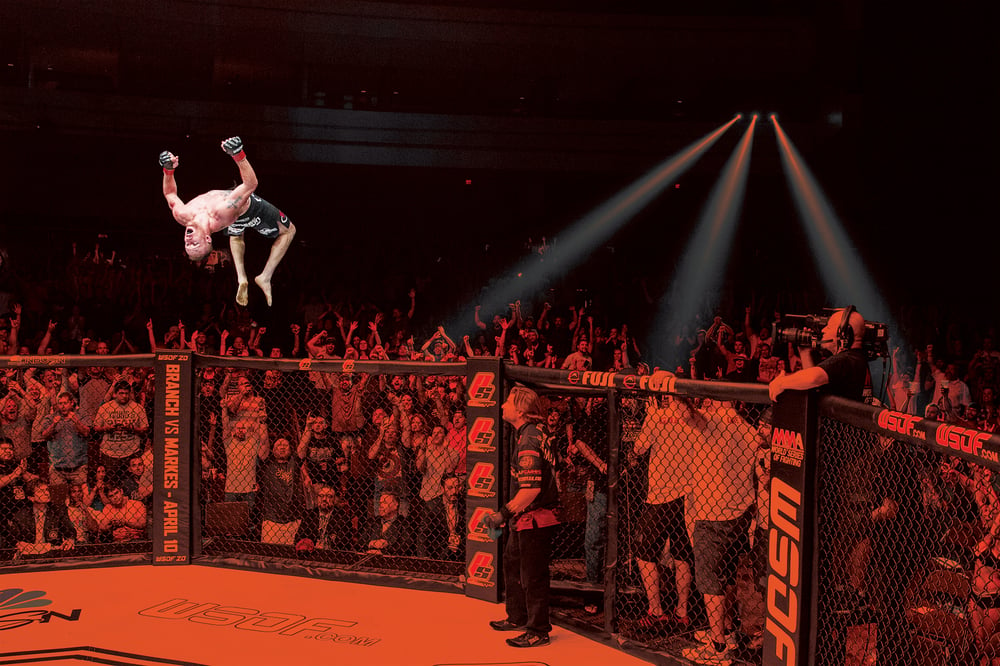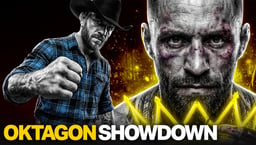
Issue 160
November 2017
How ‘The Highlight’ became the most relentless competitor in the UFC.
Anybody who’d seen Justin Gaethje compete in World Series of Fighting knew there was a chance he might do something special in the UFC.
The self-proclaimed ‘most violent guy in the lightweight division’ had a reputation for going to war, even when it might have made more sense – for his health, at least – to take a more measured approach. The question was: could he fight like that against the very best in the world?
The answer is a resounding ‘yes’. Not only did he become the first fighter to TKO Michael Johnson, he did it in a contest that became the frontrunner for Fight of the Year. His performance earned him a coaching gig on The Ultimate Fighter opposite Eddie Alvarez, which could get him within reach of a title shot quicker than anyone in recent memory.
Here's what’s next for one of – if not the – most exciting fighters in the world.
Your reputation for exciting fights preceded your move into the UFC, but can you tell us a little about your life growing up?
I grew up in a little town called Stafford, Arizona, which has like 10,000 people. It’s so secluded. We have a Walmart, then nothing other than a Walmart.
You have to drive for two hours just to get to a city. Copper mining is definitely the main source of jobs there.
Were you always fighting?
Not really, I was just playing sports. I started wrestling at four, played soccer, was on the swim team and then, in the seventh grade, started playing football and baseball. I was always very active, athletic, playing sports.
There wasn’t much to do. I had 12 kids around my age living in my neighborhood, so we were always outside playing football or baseball.

Did your father and twin brother try to persuade you to follow the family tradition and work at a copper mine?
No, they didn’t necessarily try. They wanted me to go to school and college and stuff. I was at the mine for one summer.
I worked seven days a week for 12 hours, then spent an hour driving back and forth from home.
I did it for three months straight and took one sick day. That was a crazy experience. They work hard.
What was your job?
It’s called ‘the shovel’. It has a scoop and it picks up the dirt and then it deposits debris in the dump truck.
It’s like the biggest dump truck you’ve seen in your life. The mine itself is as big as you can imagine. It’s huge.
You can’t look at it and see the whole thing. You’d have to have an aerial view, and it’s probably 2,000 feet to the bottom of the huge, open pit.
Is your twin as tough as you?
Yeah. Marcus is my twin brother, so he has no choice. We were always wrestling. He was my wrestling partner all the time.
What’s the difference between you?
He’s probably cleverer than me: getting punched in the face for a living isn’t the smartest choice. I went to college and wrestled, and it led me to where I am right now.
He started working for the copper mine and he’s bought a couple of houses, sold them, and been a lot more stable than how I was living one or two years ago.
Even now, it’s not that stable. He has a stable income and the best health insurance you can get, so it’s a great way to make a living.
He wrestled from four years old to 12 or 13, then started playing basketball. He is taller than me and was much better at basketball.
Were your parents happy for you to go to college?
Yeah, they were. My mum has eight brothers and sisters and I was the first of that first generation to go to college. They were real proud. It was a great time. Leaving Stafford and going to Colorado all by myself, I didn’t know anybody.
I didn’t have to introduce myself to anybody in my whole life and now all of a sudden I didn’t know what I was doing. That was a tough time, coming out of a small town, but it was the only thing I had to deal with.
Where does your competitiveness come from?
My mum is Mexican and my dad is German, and I’ve been playing sport since I was four or five. My parents are the most competitive people on earth. We don’t have the patience for things like cards.
Do your parents come to your fights?
Yeah. Of my 25 amateur and professional fights, they’ve been to every single one bar one. I didn’t tell them about it because it was last second. They are the best parents a kid could have.
We were in massive debt and they were trying to give me these opportunities to fulfil my goals and stand out. My dad would take off work all the time to go to practice, not even games. I have great parents. That’s one of the main reasons I’m able to go in there and be content with winning and losing.
It was reported GSP used to come to your college for wrestling practice. Did you get on the mat with him?
He would come up to our college and wrestle with us. I wrestled him. As for MMA at the time, I’d never put a boxing glove on or practiced one day until I was 19. He was good. He was big. He probably weighed 200lb and I weighed between 155lb-170lb.
As a kid, you remember those guys who’d come up and wrestle with us.

Tell us about your relationship with your coach, Trevor Wittman.
Trevor is a godsend for me. He’s the first guy who taught me how to fight. I was a pure wrestler, but I had my aggressive mindset. He really refined it and formed the way I fight. He’s a great coach and does great things for me.
Is it more important to win, win belts, or please the fans?
All of it’s very important. One of my main focuses is to work hard every single day so I can go out there and put it on the line. That’s how I win. The only way I’ll lose is if I’m not prepared to go to those lengths.
I love fighting the way I do and breaking people up. No one is used to fighting like that. No one is used to their heart beating at that pace for 15 minutes. I just put them in a place they have never been. It’s always entertaining. I just look to break guys as soon as possible.
How would you assess the biggest change in your life so far since becoming a fighter?
I wouldn’t have gone from 7,000 to 38,000 followers on Twitter if I hadn’t signed with the UFC. Things like that, you notice. I’ve also got all these opportunities now. The [Johnson] fight itself was nothing new, nothing different. I’ve won them all so far but win or lose, I’m going to assess the fight for four or five days, then forget about it and it’s on to the next one.
You’re only remembered by your last fight. Right now that’s my last fight, but I’m going to have a next fight against Eddie Alvarez. Forget what I just did, as it pretty much doesn’t mean anything anymore. It’s on to the next one.
Will you be calling out Conor McGregor if you defeat Alvarez?
I wouldn’t say no, but I don’t want that to be the headline of this interview. The truth is that I don’t care. I don’t get to make that call. I wish I did, because then his name would be mentioned. But I’m just going backflipto keep knocking people out.
This sport rewards people who take chances. I’m out there to perform and finish people and everything comes off of that. I’ve watched McGregor fight as an MMA fighter, but as far as him being an opponent, I haven’t critiqued him properly.
I would love to fight him, of course. He’s the best in my weight class and I think I’m the best in the world. If I am to prove that, I have to beat him. I’m looking forward to it, hopefully.
What’s the plan for the rest of your MMA career?
I want to play golf when I’m 50, 60 years old. I don’t want to do this forever. Who knows? You can really never look past your next fight.
...









